Keeping your watch looking day one, every day is more than a matter of aesthetics. It's about preserving your investment and ensuring the accuracy and life of your timepiece. Maintaining your watch isn't just about winding it or replacing the battery; cleaning is a crucial part of watch care.
This guide offers actionable tips on how to care for your watch, whether it's the latest watch with fall detection and location tracking or an exquisite automatic watch handed down over decades. Let's dive in and get your watch set to impress.
How Do You Maintain the Overall Condition of a Watch?
Whether you're interested in how to maintain a watch at home or the specific processes to clean and maintain a watch, keeping your watch in top-notch condition doesn't have to be overly complex.
Here are some basic methods to maintain a pristine appearance and optimal function of your watch:
Read the Manual

Every watch comes with its unique set of care instructions. Devote some time to understanding these details. Whether it's how to wind your watch or set the date, this information is crucial for maintaining your watch and preserving its warranty.
Clean Regularly
Regularly wipe down your watch face, bracelet, or leather strap using a soft, dry cloth. If your timepiece is water-resistant, even a slightly damp cloth will suffice. However, remember to avoid harsh chemicals or solvents that can damage your watch.
The Watch Care Company has a complete set of watch care kits—a great alternative to help watch lovers like you clean their watches even at home. Our ingredients are guaranteed 100% natural, pH neutral, anti-fungal/anti-bacterial with zero ammonia, chlorine or bleach which are proven safe and effective for cleaning different types of watches.
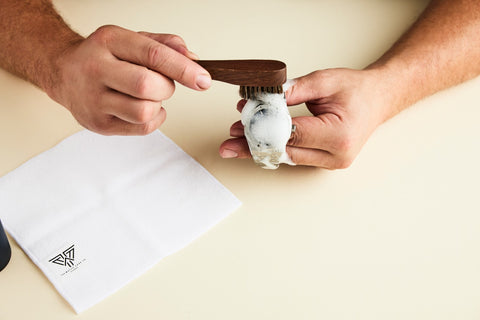
Avoid Chemicals and Magnets

Image Credit: Worn and Wound
Keep your watch away from exposure to chemicals. Whether you're cleaning your bathroom or caught in a sudden downpour, protecting your watch from such elements ensures it maintains its appearance and accuracy.
Additionally, magnets are best kept away from watches because they can seriously disrupt the timekeeping function of the watch. For mechanical watches, magnetic fields can affect the balance wheel and hairspring, causing the watch to run erratically - it might run fast, slow or even stop altogether. As for quartz watches, magnets can affect the electric circuit and quartz crystal inside, leading to similar issues.
Keep in mind that many everyday items like speakers, smartphones, and even handbag clasps can have magnets strong enough to affect your watch. If you suspect your watch has been magnetised, a watchmaker can often quickly and inexpensively demagnetise it.
Servicing

Regular professional servicing should be a vital part of your watch care regimen. Mechanical timepieces should be serviced every 2-3 years, while quartz watches need a check-up less frequently, generally every 3-4 years.
How do you clean watch parts?

Embrace the golden rule: Gentle is the way forward. A soft, dry microfiber cloth for the exterior and a fine, moist brush for tight spots like the links and crevices can get the job done. For water resistant models, it is essential to deep clean every parts of your watch using a safe, reputable cleaning solutions to cut through stubborn grime. Remember, professional help is always the safest bet when dealing with open movements.
How is the care for most modern watches different from other watches?
Modern watches, whether they're automatic or smart watches like the Apple Watch, often come with more features, and consequently, have different maintenance needs. Automatic watches need regular winding and servicing roughly every 2 to 3 years to maintain their accuracy and longevity. On the other hand, smart watches require regular software updates to keep the features like blood pressure monitoring, fall detection and location tracking running smoothly.
How long do watches last?
Quality watches are designed to last. With proper maintenance and care, your watch can hold its aesthetic and functional value for years. However, the longevity of a timepiece will vary based on several factors like its manufacturing quality, level of care, frequency of servicing, and exposure to damaging elements.
How to Handle Specific Types of Watches?
Different watches call for different types of care. An utilitarian quartz wrist-piece will probably not demand the same attention as a sumptuous automatic watch.
How do you maintain an expensive watch?

Expensive watches are often fine-tuned machines, requiring a dedicated maintenance routine. Ensure the watch is frequently cleaned to prevent build-up of grime or debris. Service it as recommended by the manufacturer and always use a soft cloth to wipe off sweat, dirt or any forms of debris post wearing. Keep it stored securely when not in use, safe from elements that could potentially damage the watch like heat, humidity, and direct sunlight.
Does automatic watches need maintenance?
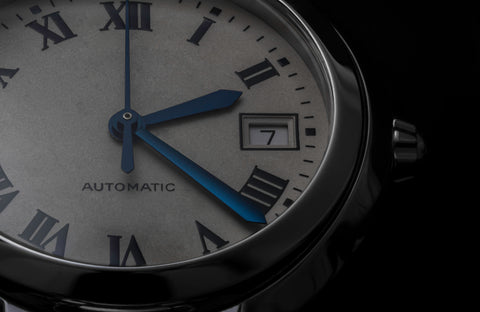
Automatic watches certainly do need maintenance. Not only should they be wound regularly (either manually or by wearing them for at least 8 hours a day), they also require servicing every two to three years to keep them running smoothly.
Do battery watches need servicing?
Battery watches, commonly known as Quartz watches, do need servicing but not as frequently as their automatic counterparts. A standard recommendation is once every 3 to 4 years. However, battery replacement should be done as soon as it runs out to avoid leakage which can damage the watch internally.
How to care for different types of watches?
Each type of watch has its unique care guidelines:
1. Mechanical Watches
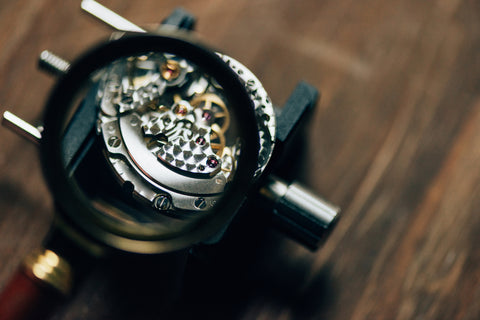
Mechanical watches are intricately crafted using hundreds of small parts and run on wound springs, without a need for batteries. These elegant and traditional timepieces require regular winding - usually every day or two to keep accurate time.
Maintenance: Mechanical watches need servicing every 2 to 3 years to ensure smooth operation of the internal parts. Avoid exposing them to impacts, dust, and moisture. Wipe them regularly with a soft cloth to remove surface dirt or sweat.
2. Automatic Watches
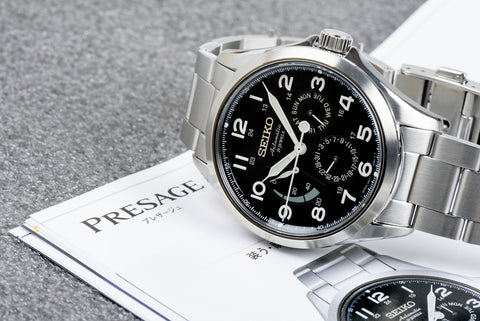
Automatic watches, like mechanical ones, operate without a battery. They leverage the movement of your wrist to wind the mainspring, storing up energy to run the watch.
Maintenance: Automatic watches need to be worn regularly or put on a watch winder to ensure they stay wound. Regular servicing, typically every 2 to 3 years, is recommended to ensure the watch's lubricants are renewing and the components are working harmoniously.
3. Quartz Watches
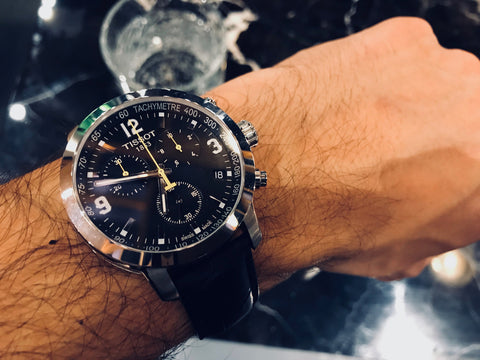
Quartz watches are battery-operated watches that are generally more accurate and less expensive than their mechanical and automatic counterparts. They use a small quartz crystal, which vibrates at a high frequency when electrical charge is applied, to keep time.
Maintenance: Quartz watches are relatively low maintenance. They only require battery changes every 2 to 5 years, depending on the model. Regular cleaning and an occasional seal check during battery replacement to maintain the watch's water resistance is quite enough.
4. Digital Watches
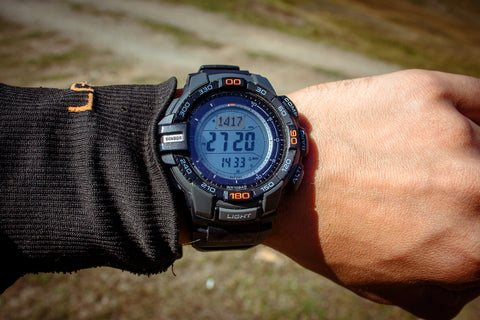
Digital watches display time digitally, often through an LED or LCD face. They're commonly battery-run, with some models equipped with rechargeable batteries.
Maintenance: Taking care of digital watches often includes regular cleaning, especially around buttons, with a soft, slightly damp cloth. While most are water and shock-resistant, it's advisable to avoid unnecessary exposure.
5. Smart Watches

Smart Watches, such as the Apple Watch, connect digital technology with traditional timekeeping. These watches aren't just for telling time but offer a variety of functionalities like fitness tracking, GPS, calls, texts, and more.
Maintenance: Regular screen and band cleaning are critical for wearability and performance. Screens should be lightly cleaned with supplied or approved cloths, whilst bands can typically be detached and cleaned with light soapy water or according to manufacturer's instructions. Regular software updates assist device performance and usability.
Each type of watch brings its unique style and requires specific maintenance to ensure it functions properly and lasts its intended lifespan. Always remember, it's most beneficial to follow your watch's specific user guide or consult with the manufacturer for care guidelines.
Can You Service Your Watch Yourself?
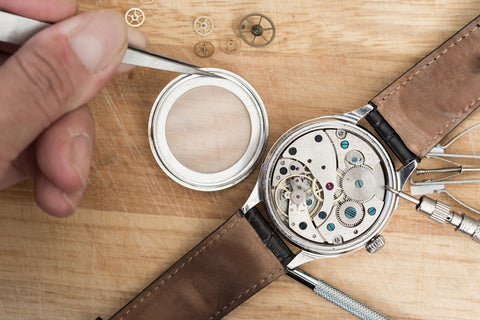
Tinkering with watches requires a trained hand and an experienced eye. However, the answer to everyone’s favourite question - Can I service my watch myself? - isn't a straightforward yes or no.
Strictly speaking, you can perform cleaning tasks and battery replacements yourself with the right tools. But remember, watches have intricate mechanics, and one wrong move can lead to permanent damage, reducing it from a cherished accessory to a frustrating money pit.
How can a person know when their watch needs servicing?
While routine service intervals are recommended, here are signs your watch might need a check-up sooner:
- Loss of Accuracy: If you notice your watch is losing or gaining time substantially, it may need a service.
- The Watch Stops Functioning: This situation is apparent with mechanical or automatic watches and quartz watches whose battery replacements didn't revive them.
- Moisture Inside the Watch: If you see condensation under the watch glass, it’s time for a service to prevent rusting.
Failure to regularly service your watch can lead to a range of problems, including reduced accuracy, compromised water resistance, and even complete failure. Once damage is done, repairs can be costly, and in some cases, impossible. Regular servicing ensures your watch stays in top-notch working order and can even increase its lifespan.
How Should You Wear and Store Your Watch?
How you wear your watch can greatly affect its longevity as well as your comfort. And while it may seem simple, correct watch storage is integral to your watch's long term health and functionality.
Should I wear my watch all the time?
While watches are designed to be worn, constantly having it on your wrist can accelerate wear and tear. It's especially advisable to take it off during activities where it could get damaged, like during sports or while doing manual labour.
What hand should a man or a woman wear a watch on?
The choice of wrist for wearing a watch largely depends on personal preference and your dominant hand. Traditionally, watches are worn on the non-dominant hand, but you should do whatever feels most comfortable.
How do you store a watch properly, both short term and long term?
When you're not wearing your watch, it’s essential that it's stored correctly to maintain its condition. For short term storage, placing your watch in its original box or a watch roll is advisable. Here at the Watch Care company, we pride ourselves in our handstitched watch rolls and shockproof single watch cases to keep your watches safe and scratch-free especially during your travels.

For long term storage, keep the watch in a cool, dry place away from sunlight. Remember, correct storage is key to maintaining your watch's quality and performance.
How do you keep a watch when not wearing it?
When not wearing your watch, always ensure it is safely stored. For automatic watches, consider a watch winder if you won't be wearing it for some time. For all other watches, a dust-free watch box, drawer, rolls or protective cases should do the trick. Each watch should be kept separate from others to prevent them from scratching each other.

Common Concerns and Myths About Watch Care
While well-founded advice on watch care is aplenty, there's also a fair share of myths and misconceptions that can lead to unnecessary concern or even harm your treasured timepiece. Let's address some of these.
Is it okay to shower with a watch? Can water damage a watch?
While many watches these days come with water resistance as a standard feature, it's not always wise to swim or shower with your watch on. The term 'water-resistant' gets easily misconstrued. In reality, not all water resistance levels are suitable for all kinds of water exposure. Soapy water like in showers can be detrimental to seals, affecting the watch's water resistance. When in doubt, keep the watch away from water.
Should I clean my watch every day?
This depends on the kind of watch, the strap material, and the general usage. However, a gentle wipe with a soft cloth each day can keep sweat and dirt at bay, maintaining the watch's aesthetics and longevity.
Conclusion
Timekeeping is an art, and a good watch is an investment worth safeguarding. With a mindful approach towards maintenance, regular cleaning, and prompt servicing, your watch can serve you well for years, or even decades, to come.
Remember, proactive care is far better than costly repairs. Irrespective of the type or make of your watch, it deserves care because, after all, a well-maintained watch isn't just a time-keeper—it's a conversation starter, a personal style statement, and a testament to your attention to detail. So, follow these guidelines and keep your watch looking day one, every day!


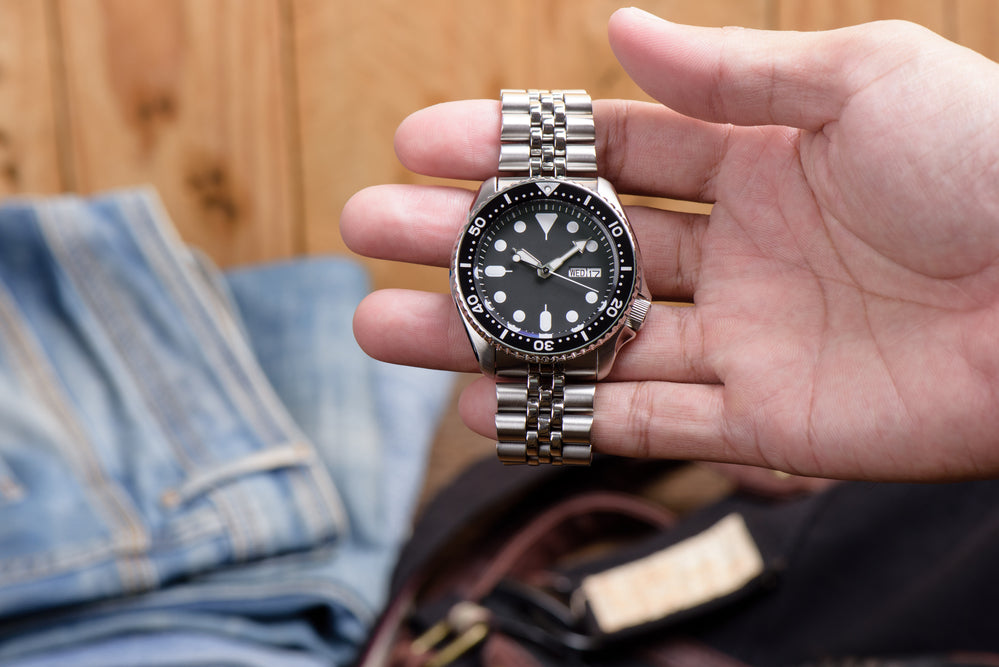
Share:
How Often Should a Watch Be Cleaned?
How To Choose Your Watch Band